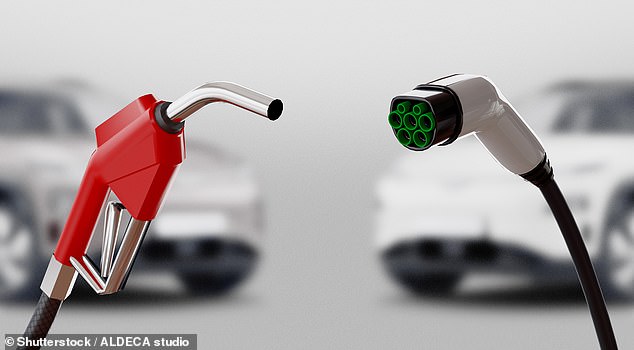Electric car owners celebrate 1 August as it’s when ‘average petrol bills surpass EV charging costs for the calendar year’
- It’s been estimated that today is when EVs are ‘free to drive’ compared to petrols
- Calculation is based on the cost to cover average annual mileage of 7,400 miles
Electric car drivers across Britain are said to be celebrating today.
That’s because 1 August marks the date when the cost of filling up a petrol car surpasses the electricity bills to charge an EV for the calendar year, according to one business operating in the EV sector.
It estimates that the average EV owner pays £740 in charging costs per year – and drivers of petrol engine cars will have racked up the same amount in fuel receipts today.
The Electric Car Scheme has calculated that today is the date when petrol car drivers have spend the same in fuel bills as what EV owners pay to charge their vehicles for the entire year
Today is said to be the crossover point when EV owners are ‘driving for free’ compared to those who own petrol cars, says The Electric Car Scheme – a company that helps motorists access government tax incentives for EV salary sacrifice.
It has dubbed 1 August ‘Electric Car Day’ as it ‘underlines just how much more affordable electric cars are, with average EV drivers essentially getting five months of free driving’.
The bold claim comes after it crunched the numbers on annual fuel costs for the average UK driver to travel 7,400 miles a year (the national average in 2019).
The calculation is based on the average price of petrol so far this year (146.26p a litre) and a vehicle returning 38.8mpg, bringing its total annual fuel bill to £1,268.
For the cost of running an EV, it used a figure of 0.10p per mile for electricity, which – to cover 7,400 miles – would bring the annual cost to £740. This is based on the assumption that an EV owner exclusively plugs their cars in at home at a cost of 34p/kWh.
It worked out that the average petrol car costs £3.47 a day in 2023, meaning an owner would have spent £740 by 1 August.
However, questions can be raised about the figures.
While the vast majority of EV owners today are using homechargers to replenish their cars’ batteries, it does overlook the higher cost of using public devices, especially when completing longer journeys and the higher charges at motorway services.
Though EV drivers can also argue that there are EV-dedicated electricity tariffs where the cost of charging at off-peak times is far lower than the 34p/kWh price cap.

The calculation is based on the average price of petrol so far this year (146.26p a litre) and the average cost per mile for electricity of 0.10p. It worked out that the average petrol car costs £3.47 a day in 2023, with £740 spent by 1 August
With fuel prices changing by the day and electricity costs also subject to inflation and deflation, the date for when the company says the crossover point arrives is not static.
For instance, when UK fuel prices were higher a year ago, the date in which EV owners were said to be driving for free was from 7 July.
And with the AA reporting today that both petrol and diesel prices are back on the rise, it suggests that EV owners could be reaping the reward of cheaper ‘fuel’ costs earlier than 1 August.
Thom Groot, chief executive of Electric Car Scheme, said: ‘The next time you pull into a petrol station to fill your car up, take a second to think through how much you’ve spent on petrol already this year.
‘If you were driving an electric car that money you’ve already spent would be your total fuel cost for the year – but instead you’ll have to pour loads more cash into your petrol tank before the year is out.
‘And that’s not even considering the emissions being belched out of your exhaust.’
However, he adds that the calculation doesn’t take into account the premium upfront costs associated with buying an electric car instead of one with a combustion engine.
Today, the difference in the price of a new electric family car compared to an equivalent petrol is around £10,000. Given the Electric Car Scheme worked out the annual price difference in annual ‘fuel’ costs is £528, it would take almost 19 years of cheaper charging to earn this difference back using its basic calculation.
Edmund King, AA president, added: ‘The data is clear: It’s far more affordable to drive an electric car than one powered by petrol, or indeed diesel, and that difference is likely to grow in the next couple of years.
‘EVs remain more expensive upfront than petrol cars, but prices are coming down so I’d encourage anyone to work out whether an EV might be a better deal for them financially and environmentally in the long run.’


